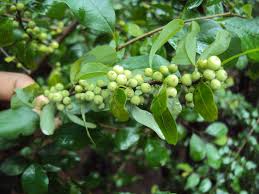
Guggulu is a small thorny tree growing in dry, arid areas. Guggulu resin has a remarkable cholesterol controlling action and is a good remedy for rheumatism.
Benefits of Guggulu: Bronchitis, piles, increases white blood cell count, indigestion, neurosis, skin diseases, sores, cough, edema, arthritis, ulcers, gout, cholesterol, nervous disorders, bone fractures, tumors, ulcers.
Action: Alterative, analgesic, antispasmodic, astringent, expectorant, nervine, rejuvenative, stimulant.
Scientific name: Commiphora wightii
Useful part: Resin.
Dosage: 3–9g per day in a decoction, 250mg–3g
Energetics
Rasa (taste): Bitter, pungent, astringent, sweet
Vırya(energy): Heating
Vipaka (post-digestive effect): Pungent
Guna (quality): Light, penetrating,
Dosa effect: VPK−, can aggravate P in excess
Dhatu(tissue): All tissues
Srotas (channel): Circulatory, digestive, nervous, respiratory
Description: It is a small tree upto 3-4m height with spinescent branching. Stem is brownish or pale yellow. Leaves are alternate, 1-3 foliate, obovate, leathery and serrate . Flowers small, brownish red. Fruit is a drupe and red when ripe, ovate in shape.
Classical and common names
Ayurvedic: Gugulu, Mahisaksah, Koushikaha, Devadhupa
Tamil, Telugu: Gukkulu
Hindi:Gugal
Malayalam:Gulgulu
Kannada: Guggul
Botanical classification
Kingdom: Plantae
Division: Magnoliophyta
Class: Spermatopsida
Order: Sapindales
Family: Burseraceae
Genus: Commiphora
Species: Commiphora wightii